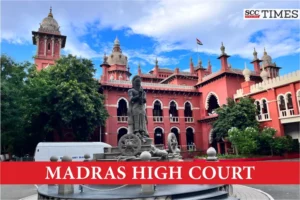Madras High Court: In a criminal revision filed to set aside the orders passed by the Principal Sessions Court, wherein the Court rejected the discharge petition as the accused has failed to made out prima facie case for discharge, the division bench of S.M. Subramaniam and Dr. A.D. Maria Clete, JJ. while upholding the impugned order, said that the burden of proof lies on the affected person, who in turn has to prove his innocence during trial. Adjudication of those materials placed by the accused would be unnecessary for this Court, while dealing with the discharge petitions.
Further, the Court emphasised that mere possession of proceeds of crime would be sufficient to invoke the provisions of Prevention of Money Laundering Act (‘PMLA’). Using the proceeds of crime by itself is an offence. Since the scope of Section 3 is wider enough to cover various circumstances in order to curb the economic offences, the High Court cannot restrict its meaning so as to restrain the Authorities from invoking the provisions of PMLA.
Background:
The Central Bureau of Investigation (CBI) registered FIR under Section 120B read with Sections 420, 471 of the Penal Code (IPC) 1860, and Sections 7, 8, 13(2) read with 13(1)(d) of the Prevention of Corruption Act, 1988 against the accused and others for collecting money from various persons from lower level cadre in Indian Overseas Bank. Another FIR was registered by the CBI, ACB for the offences under Section 120-B of IPC and Section 13(2) read with Section 13(1)(e) of the Prevention of Corruption Act, 1988 against the accused for amassing huge assets disproportionate to his known source of income.
As per the FIR the accused persons had amassed huge wealth in the form of Fixed Deposits and immovable properties to the tune of Rs. 2,03,84,378/- disproportionate to his known sources of income during the period 01-01-2010 to 30-06-2011. Another FIR was registered by the Central Crime Branch under Sections 406, 408, 471, 420 and 506(ii) IPC against accused persons belonging to All India Indian Overseas Bank Employees Union for diverting the funds collected from the members of All India Indian Overseas Bank Employees Union and purchasing property in the name of the accused.
Analysis and Decision:
The Court noted that the complaint against the accused 2 was filed under Section 45(1) read with Sections 3, 4 and 8(5) of PMLA. As per the complaint, the accused 2 was a First Trustee as per the Trust Deed and its subsequent Amendment Deed. In his capacity as a First Trustee, along with accused 1, he had entered into various agreements for purchasing of property.
The Court after noting that subsequent to the registration of FIR, out of apprehension and anticipation, the accused 2 has submitted his resignation letter on 11-8-2014, said that no document is produced in support of his contention nor there is any such confirmation as to if the resignation letter has been accepted by the Founder Trustee.
The Court highlighted that by virtue of Section 46 of Trusts Act, 1882, a trustee, who has accepted the trust cannot afterwards renounce it except (a) with the permission of a Principal Civil Court of Original Jurisdiction, or (b) if the beneficiary is competent to contract, with his consent, or (c) by virtue of a special power in the instrument of trust. Thus, the accused 2 cannot unilaterally claim that he had relinquished his office, when the Trust instrument of accused 4 has not specifically authorized accused 2 to relinquish his office.
The Court reiterated that a Trust, either private or public / charitable or otherwise, is a juristic person and a body corporate, which is liable under Section 71 of the PMLA, 2022 and the same constitutes an offence punishable under the PMLA, 2002.
The Court further noted that as per Section 11 of the Penal Code, 1860, companies, partnerships, societies, and other bodies of persons can be prosecuted for offences committed under the Code.
The Court also took note of Section 2(s) and Section 70 of PMLA, 2002 and concluded that a trust is also an artificial person, as it is an association of parties who jointly fulfil a common purpose.
The Court said that the accused 2 had abetted the accused 1 in acquisition, possession and use of the proceeds of crime and in projecting such proceeds of crime as untainted properties.
The Court, after examining the scope of Section 3 PMLA, concluded that it is not open to read the different activities conjunctively because of the word “and”. If that interpretation is accepted, the effectiveness of Section 3 PMLA can be easily frustrated by one person possessing proceeds of crime and his accomplice would indulge in projecting or claiming it to be untainted property so that neither is covered under Section 3 PMLA. Thus, PMLA can certainly be invoked against a person who is as long as in possession of and enjoyment of Proceeds of Crime.
The Court emphasised that mere possession of proceeds of crime would be sufficient to invoke the provisions of PMLA. Using the proceeds of crime by itself is an offence. Since the scope of Section 3 is wider enough to cover various circumstances in order to curb the economic offences, the High Court cannot restrict its meaning so as to restrain the Authorities from invoking the provisions of PMLA.
After taking note of Section 24 PMLA, concluded that the presumptions of the authorities, investigation conducted, and documents collected would be sufficient to proceed against a person under PMLA. Unless the contrary is proved, presumption can be drawned that such proceeds of crime are involved in money laundering. Therefore, the burden of proof lies on the affected person, who in turn has to prove his innocence during the trial.
[S. Srinivasan v. Assistant Director, 2024 SCC OnLine Mad 5418, decided on 04-10-2024]

